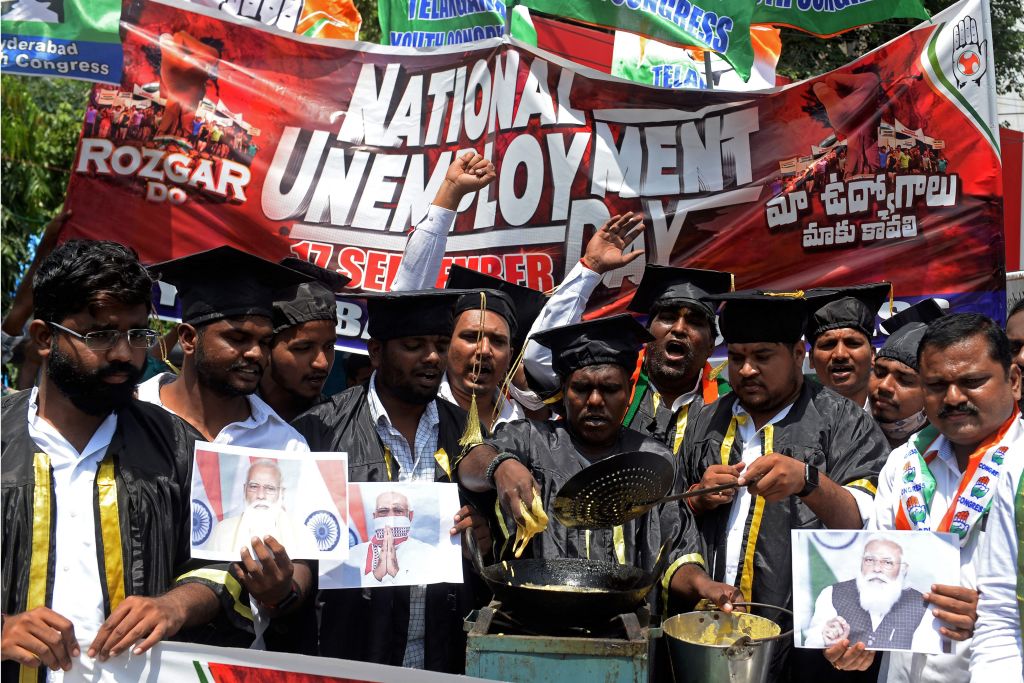- Monday, May 06, 2024

By: Shubham Ghosh
AS the coronavirus pandemic crippled several businesses in India, especially the small ones, many of India’s youth who were behind those businesses, are making a move to shift base to Canada.
They are meeting consultants who promise a work visa for the North American country. Many of these youth are also keen to move to Canada as they have failed to find a suitable job despite having a degree.
One such youth is Srijan Upadhyay. The 31-year-old used to supply fried snacks to small eateries and roadside stalls in the poor eastern Indian state of Bihar before the pandemic hit his business. Most of his customers shut down their operations and many did not even pay him his due, Reuters reported.
Finding no way forward, the 31-year-old undergraduate in the information technology sector went to Rajpura town in the northern state of Punjab to meet the consultants for emigrating to Canada, the Reuters report said, adding that he brought with him a neighbour who also wants a Canadian visa as he failed to get a visa.
“There are not enough jobs for us here, and whenever government vacancies come up, we hear of cheating, leaking of test papers,” Upadhyay told Reuters, waiting in the lounge of Blue Line consultants. “I am sure we will get a job in Canada, whatever it is initially,” he added.
India’s unemployment rate is estimated to have exceeded the global rate in five of the last six years, data from the Centre for Monitoring Indian Economy (CMIE), Mumbai, and International Labour Organisation have shown. An economic slowdown worsened by the pandemic has been the reason behind it.
According to the CMIE, India’s joblessness peaked at more than 23 per cent in April 2020 when the first wave hit the country but dropped to 7.9 per cent in December 2021.
In Canada, on the other hand, the rate fell to a multi-month-low of 5.9 per cent in December, while the OECD (Organisation for Economic Cooperation and Development) group of mostly rich nations reported a sixth consecutive month of decline in October, with countries including the United States experiencing labour shortages as economic activity is regaining speed, Reuters added.
India’s problem is acute since its economic growth is producing fewer jobs than it used to and as jobseekers either take menial roles or look to shift base, the country’s already low rate of workforce participation is dropping further.
“The situation is worse than what the unemployment rate shows,” CMIE managing director Mahesh Vyas told Reuters.
“The unemployment rate only measures the proportion who do not find jobs of those who are actively seeking jobs. The problem is the proportion seeking jobs itself is shrinking,” he said.
Critics have slammed Indian prime minister Narendra Modi saying one of his biggest failures is the hopelessness among the country’s youth. Modi, who stormed to power in New Delhi in 2014, promised creating millions of jobs but the promise is yet to be fulfilled.
The scenario also risks India squandering its demographic advantage of having more than two-thirds of its 1.35 billion people of working age.
The country’s labour ministry’s career website has shown that there were more than 13 million active jobseekers as of December but the number of vacancies was only 220,000.
The ministry told the parliament in December that “employment generation coupled with improving employability is the priority of the government”, reiterating its focus on small businesses.
Modi’s political rivals are now trying to take advantage of the crisis ahead of the upcoming elections in five states, including Punjab and the most populous Uttar Pradesh, in February and March.
“Because of a lack of employment opportunities here, every kid looks at Canada. Parents hope to somehow send their kids to Canada,” Delhi chief minister Arvind Kejriwal, whose Aam Aadmi Party is contesting the elections in Punjab, said at a recent public function there.
“I assure you, within five years they will start returning because we will create so many opportunities for them here,” he added, backing his party’s chances of winning power in the state for the first time.
Kejriwal though did not explain the reason why those who are leaving for Canada would return to the country but workers in his party said their policies would attract job-generating business ventures.
According to Vyas, India needs more investment in labour-intensive industries and should bring more women into its labour force, like neighbouring Bangladesh has done through its garment factories.
Between 2018 and 2021, India suffered its longest period of slowdown since 1991, with unemployment averaging 7.2 per cent, CMIE data showed. Global unemployment was around 5.7 per cent on an average in that period.
In India, 12 million people reach employment age annually but the economy has not grown fast enough to absorb so many people, economists point out.
Moreover, the rise in workforce for every percent increase in gross domestic product has gone down: the economy will have to grow at 10% to raise employment by 1 per cent, said Amit Basole of Azim Premji University.
In the 1970s and 1980s, when the gross domestic product growth was three to four per cent, the employment grew around two per cent, Basole told Reuters.
But those in counselling for employment abroad were seeing their businesses doing well. In Punjab, Blue Line counsellor Lovepreet (gave only one name) said business was booming, with his agency handling some 40 clients a day.
“I have been doing this for four years,” the 27-year-old told Reuters.
“I am off to Canada myself, this year or next year. Politicians keep promising us government jobs, but no one delivers,” he said.
![]()